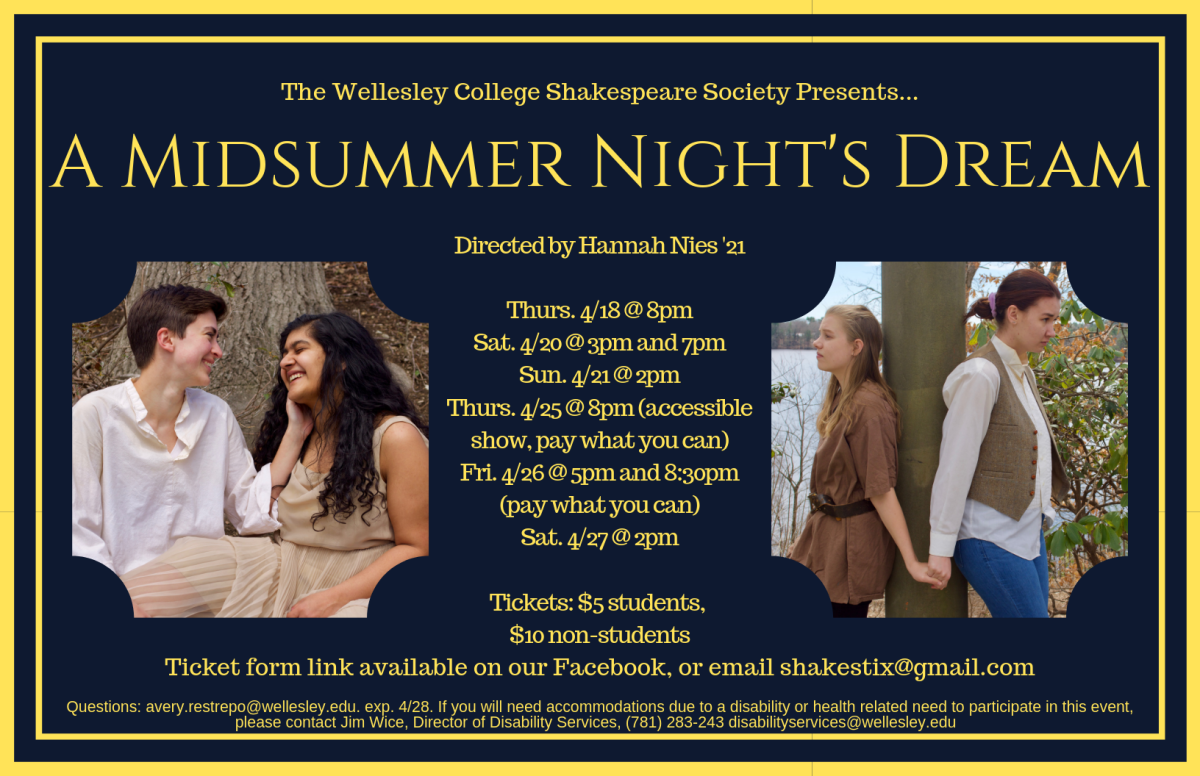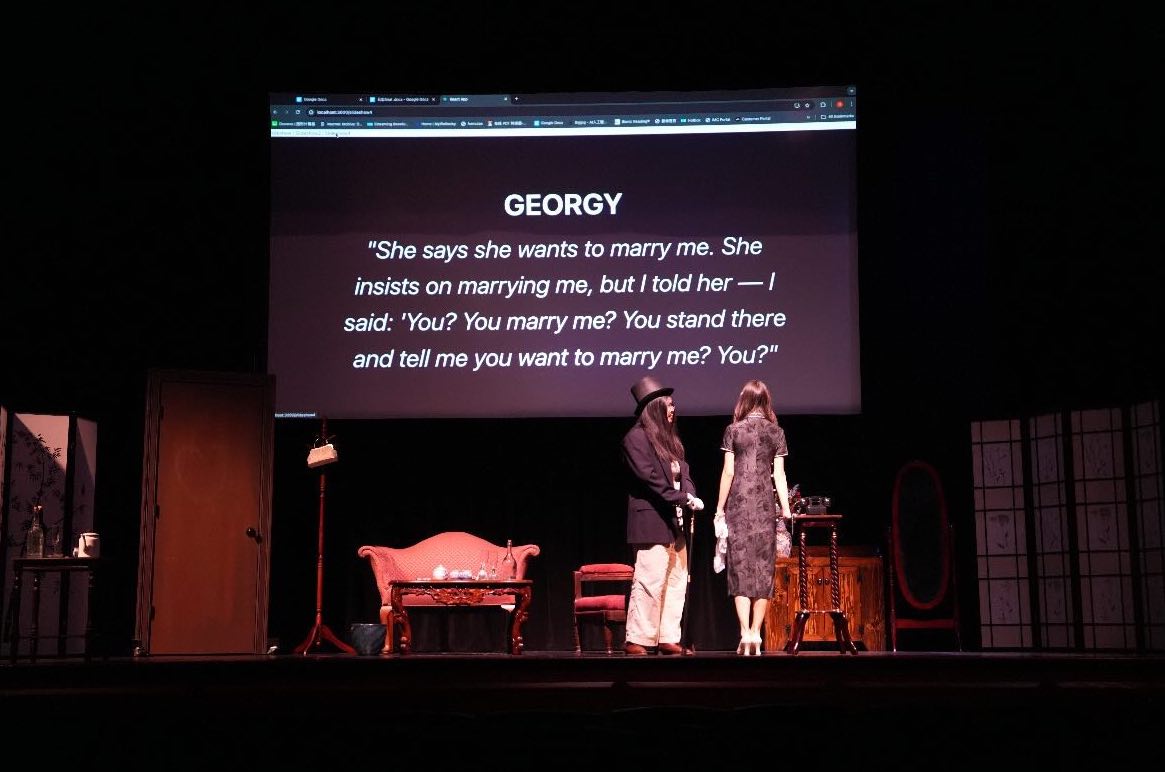“A Midsummer Night’s Dream,” one of William Shakespeare’s most well-known comedies, famously follows the plight of two sets of lovers as they navigate the fairy-filled woods of Athens. In Wellesley’s production directed by Hannah Nies ’21, currently playing at the Shakespeare Society house, the lovers have been given an added twist: the role of Helena has been changed into a man, Helenus. This gives a contemporary, queer take on a traditionally heterosexual story.
Lysander (a sweet Avery Restrepo, ’20) and Hermia (the hilarious Sabina Sethi Unni, ’19) decide to run away together after Hermia’s father declares that she must marry Demetrius (Paige Befeler, ’22). Demetrius is also in love with Hermia, despite the fact that he was previously interested in her best friend, Helenus (Elise Griffin, ’19). The lovers find themselves at the mercy of the bickering fairies led by Titania (Lily Jackson, ’20), Oberon (Gabriella Garcia, ’22) and Puck (Sarah Wendy Burman, ’22). Meanwhile, a troupe of “rude mechanicals” is working on a play for the duke’s upcoming nuptials. Puck turns Bottom (Katianna Conde, ’20), their boisterous leader, into a donkey. Titania, drugged by Oberon, falls in love with the ass-headed Bottom. The ensuing chaos offers a fun, engaging and unexpectedly poignant night of theater.
Director Nies’ bold choice of changing the role of Helena to Helenus pays off because the character offers new and exciting ways in which to view the play. The first scene between Helenus and Demetrius electrifies with its newfound emotional depth. Now there is a double betrayal: Demetrius has left Helenus for a woman, as well as his best friend. In an impeccably acted scene, we get the sense that Demetrius still loves Helenus, but is unable to be with him because of family pressures. After all, Hermia’s father has personally championed for Demetrius to wed his daughter. It would be difficult for Demetrius to eschew such an honor for anyone, let alone another man. In this interpretation, Helenus’ refusal to leave Demetrius’s side becomes an act of defiance and bravery in the face of such heteronormative pressure. Griffin’s Helenus is earnest, gutsy and endearing. Her honest and touching relationship with Befeler’s Demetrius helps to emotionally anchor a show that offers strong performances and plenty of laughs.
Conde as Bottom elicits a fair share of guffaws. Their spasms of donkey braying are truly worth the (small) price of admission. Sally Morris ’19, Nicole Doerges ’22, Tessa Rudolph ’22, Mallika Machra ’20 and Victoria Yiwei Gao ’22 are thoroughly entertaining as the rest of the mechanicals, while Jessica Abowitz ’22 amuses as the erstwhile servant Philostrate. The mechanicals’ performance of “Pyramus and Thisbe” offers a hilarious and satisfying end to the evening’s shenanigans.
However, this production of “Midsummer” truly belongs to the fairies. Burman is a wonderfully impish Puck, while Jackson’s radiant Titania perfectly pairs with Garcia’s understated Oberon. Though the two are in the midst of a marital spat, it is clear that they love and respect each other. The duet they sing a capella is truly magical moment. In a particularly effective casting choice, Jackson also takes on the role of Duke Theseus, while Garcia plays his betrothed Hippolyta. This allows for the actors to show off a different side of their range, while also suggesting that the fairies rule over the humans in a land in which gender is as malleable as their whims.
The sparse set by Lindsay Gordon ’21 offers an evocative, yet simple, playing space. This is offset by Eleanor Mallett’s ’22 compelling costumes. The fairies live in a vivid world where stripes of different colors are painted on their bodies. The lovers also gain more and more of these stripes the longer they stay in the woods. By the end of the play, they, too, have stripes of reds and yellows on their faces and arms, which once again serve to emphasize the power the fairies have over the humans of Athens.
Director Nies excels in all aspects of this tightly paced, thoroughly engaging production. She gleans something new out of every scene, pushing her actors to approach this classic with fresh eyes. Her bold concepts never overwhelm; instead, they offer a unified vision that enhances the original material. This production might not be true to Shakespeare’s original intent, but it offers up a more modern and worthy interpretation of one of the Bard’s best-known works. Run – don’t walk – to the Shakes house to see this wonderful show. And don’t be surprised if you leave feeling as if you were splashed with the magic of the fairies.
Remaining Performances:
Thursday April 25th @ 8pm (downstairs show, pay what you can, talkback with SAAFE afterward)
Friday April 26th @ 5pm and 8:30pm (pay what you can)
Saturday April 27th @ 2pm







